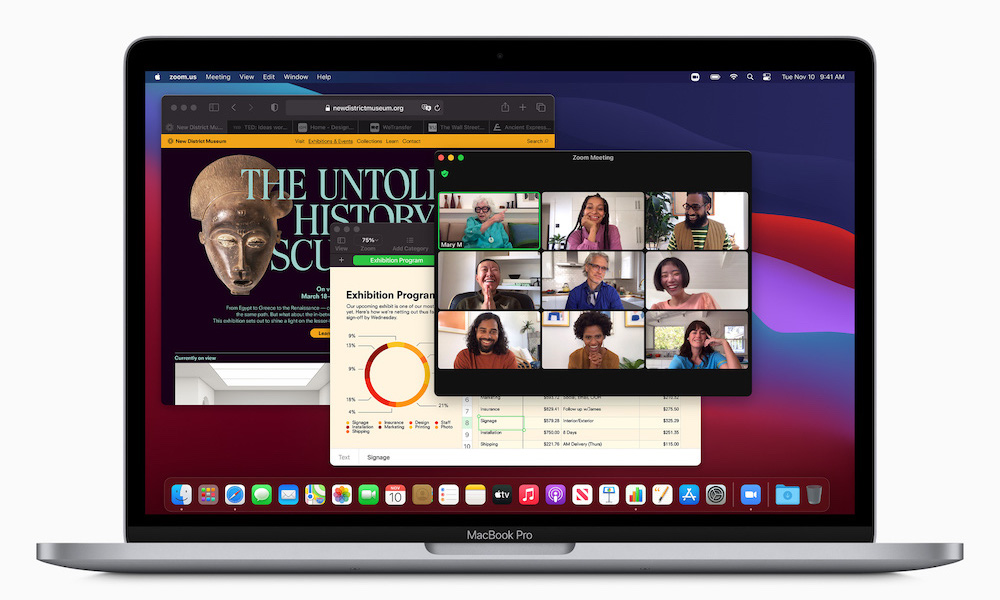Apple Releases macOS 11.2 Big Sur, Fixing Bluetooth Issues, ProRAW Editing (and More)
 Credit: Apple
Credit: Apple
Toggle Dark Mode
Following last week’s release of the slate of iOS, watchOS, and tvOS updates, Apple is now pushing out the 11.2 update of macOS Big Sur, addressing a number of issues, including one that particularly impacted users of its newest M1 MacBooks and Mac mini.
Specifically, many users who jumped into the latest Apple Silicon Macs have been experiencing problems with external displays and Bluetooth accessories, such as external keyboards, mice, and trackpads, and while there were workarounds for some of these problems, they could be a bit of a pain to deal with, and even those solutions didn’t work for everybody.
In fact, over the course of the past two months, multiple threads on Reddit and Apple Discussions have accumulated hundreds of posts from users frustrated by the inability to reliably use a wide variety of Bluetooth accessories, ranging from third-party mice, keyboards, and headphones to Apple’s own AirPods, Magic Mouse, and Magic Keyboard.
Fortunately, with macOS Big Sur 11.2, it looks like Apple has finally addressed this issue, which should allow M1 MacBook users to go back to using wireless accessories at their desk without suffering from random disconnects and battery draining issues.
What Else Is Fixed
In addition to the Bluetooth problems, which were arguably the most significant in prior versions of macOS Big Sur, there are a few other problems that the 11.2 update addresses.
This includes another M1-specific problem related to using external displays for some users — a problem that wasn’t as widespread as it only affected those using an HDMI to DVI adapter with the Mac mini, but one that could still be pretty serious for some, since of course the Mac mini doesn’t have a built-in display.
Users should also now be able to successfully save edits to ProRAW photos taken on an iPhone 12 Pro or iPhone 12 Pro Max, and won’t have to risk iCloud Drive spontaneously being disabled when tweaking other settings. Here are the full release notes:
macOS Big Sur 11.2 improves Bluetooth reliability and fixes the following issues:
– External displays may show a black screen when connected to a Mac mini (M1, 2020) using an HDMI to DVI converter
– Edits to Apple ProRAW photos in the Photos app may not save
– iCloud Drive could turn off after disabling the iCloud Drive Desktop & Documents Folders option
– System Preferences may not unlock when entering your administrator password
– Globe key may not display the Emoji & Symbols pane when pressed
Although it’s not mentioned in the release notes, MacRumors adds that Big Sur 11.2 also fixes a scenario that caused Apple’s first-party apps to bypass third-party firewalls and VPN apps. Originally, Apple had decided to exempt its own apps from being processed by content filters in Big Sur, preventing network security apps from inspecting traffic from those apps. However, after security researchers raised concerns that malware could use these exemptions to bypass security software, along with the privacy issues of Apple tracking the real IP addresses of those otherwise using VPNs, Apple chose to accelerate the process of removing these exceptions.
To be fair, according to Apple this was never intended to be a permanent situation. The company had previously noted that it was a bandage to deal with bugs released to shifting away from network kernel extensions in Big Sur, and Apple has been gradually addressing those bugs such that the exclusion list is no longer necessary.
How to Get It
The macOS Big Sur 11.2 update is available now through the standard software update procedure:
- Open System Preferences.
- Click Software Update.
- Click Update Now. If the update has already been downloaded automatically, click Restart Now instead to begin the installation process.
Note that if you’ve already been running the public beta version of macOS Big Sur 11.2 you may not get this update as you could already be running it — it’s build 20D64, which is identical to the RC3 version that Apple released to testers last week. Here’s how to check which macOS Big Sur build you’re actually running:
- Click on the Apple menu in the top-left corner of your screen.
- Click on About This Mac.
- Click on the “Version” line to display the build number (e.g. “Version 11.2”).
After two decades of releasing major Mac OS X and macOS updates as version 10 point releases (e.g. Mac OS X 10.0 Cheetah through macOS 10.15 Catalina), Apple has finally shifted to version 11 with Big Sur, and the overall version numbering appears to have changed as a result. It looks like Apple will be continuing to number minor bug-fix releases with full point release numbers going forward (e.g. 11.1, 11.2), as opposed to the “sub-point” numbering that it used in prior macOS 10.x versions.
This also suggests that next year’s release will be macOS 12, and that we’ll continue to see full integer numbering for all future macOS versions, in much the same way Apple has handled iOS from the very beginning.






